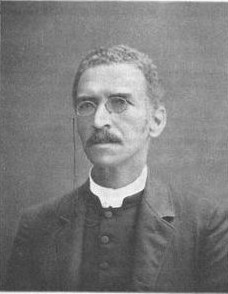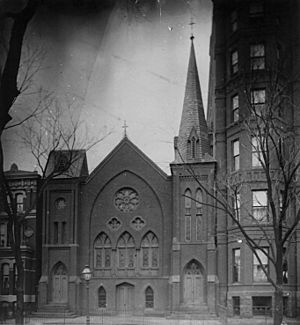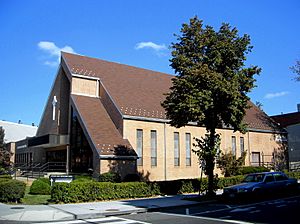Francis James Grimké facts for kids
Francis James Grimké (born November 4, 1850 – died October 11, 1937) was an important Presbyterian minister in Washington, D.C. For over 50 years, he was known as one of the most important African-American religious leaders of his time. He worked hard for equal rights for all people. He was part of the Niagara Movement and helped start the NAACP in 1909.
Contents
Early Life and Family
Francis Grimké was one of three sons. His father was Henry Grimké, a white man who owned slaves in Charleston, South Carolina. His mother was Nancy Weston, an enslaved woman of both European and African heritage. Henry Grimké and Nancy Weston had a family together. They lived on his plantation, where they had more privacy.
Both Henry and Nancy taught Francis and his brothers, Archibald and John, how to read and write. Henry Grimké came from a large family. Two of his sisters, Sarah and Angelina Grimké, became famous for fighting against slavery. They moved North to join other activists.
Challenges and Education
Henry Grimké died in 1852. He left Nancy and their two sons, Archibald and Francis, to his son Montague Grimké. Henry wanted them to be treated like family members. However, Montague did not provide for them well.
Henry's sister, Eliza, let Nancy and the boys live as if they were free. Nancy worked doing laundry to support her family. When the boys were older, they went to a public school for free African Americans. In 1860, Montague Grimké claimed them as his slaves. He made the boys work as servants. Later, he hired out both Archibald and Francis to other people.
During the American Civil War, Francis ran away. He worked as a valet for a Confederate Army officer. He was found and put in jail for a short time. Then he was returned to Montague, who sold him to another officer. Archibald also ran away and hid for two years until the war ended.
After the American Civil War, the three Grimké boys went to schools for freed people. Their teachers saw how smart they were. Archibald and Francis got help to go to college in the North. They studied at Lincoln University in Pennsylvania. This college was created for African Americans.
In 1868, Angelina Grimké saw Archibald Grimké's name in a newspaper. She wrote to find out if he was related to her family. When she learned they were her nephews, Angelina and Sarah officially welcomed the three brothers into their family. The sisters helped pay for their college education. The youngest brother, John, stayed in Charleston with their mother.
Francis and Archibald both finished Lincoln University in 1870. Francis then went to Princeton Theological Seminary and graduated in 1878. He became a Presbyterian minister.
Marriage and Family Life
In December 1878, Francis Grimké married Charlotte Forten. She was an abolitionist, a teacher, and kept a diary. Charlotte was the granddaughter of James Forten, an important free black leader from Philadelphia. She knew many famous people who fought against slavery. Charlotte was 41 and Francis was about 13 years younger when they married. In 1880, they had a daughter named Theodora Cornelia, but she died as a baby.
Francis's older brother Archibald was a consul (a government official) to the Dominican Republic from 1894 to 1898. During this time, Archibald's daughter, Angelina Weld Grimké, lived with Francis and Charlotte. Angelina later became a teacher, writer, and activist herself.
Career and Activism
Francis Grimké started his work as a minister at the important 15th Street Presbyterian Church in Washington, D.C. This church was a major gathering place for African Americans. He led this church until 1885. He was very active in the Washington community. He then moved to a church in Jacksonville, Florida, in 1886. But in 1889, he returned to the Fifteenth Street Presbyterian Church.
On March 5, 1897, Francis Grimké took part in a meeting to honor Frederick Douglass. This meeting led to the creation of the American Negro Academy, led by Alexander Crummell. Grimké became the first Treasurer of this group and served until 1919. This group was the first major African-American learned society. It worked to correct racist ideas, promote equality for black people, and study African-American history.
Francis Grimké continued to lead the Fifteenth Street Presbyterian Church until 1928. He died in 1937, many years after his wife Charlotte.
Francis Grimké once said, "Race prejudice can't be talked down, it must be lived down." This means that people need to show through their actions that prejudice is wrong, rather than just talking about it.
 | May Edward Chinn |
 | Rebecca Cole |
 | Alexa Canady |
 | Dorothy Lavinia Brown |




